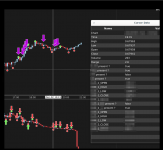Spin
Well-known member
- Joined
- May 22, 2019
- Posts
- 509
- Likes
- 216
Hello there fellow coders 
It's been a while that I launched a thread of my own, but I am afraid the time has come. Again
I am looking to use the 'values' or 'data' from a secondary plot to use in calculations.
More specifically, I would like to add fractals to a second Study
Fractals are calculated like so:
so I need to create a secondary series that holds the data from a 'Study B'
OR
I need to figure out a way to use calcSwingPoints on the data/values of Study B (Study B stores floats for Open, High, Low, Close to the dataseries)
Did anyone on this expert forum try something similar before ?
What would be a good way to tackle this ?
Thanks for all hints, tips & snippets !!
It's been a while that I launched a thread of my own, but I am afraid the time has come. Again
I am looking to use the 'values' or 'data' from a secondary plot to use in calculations.
More specifically, I would like to add fractals to a second Study
Fractals are calculated like so:
Java:
List<SwingPoint> swingPoints = series.calcSwingPoints(getSettings().getInteger(Inputs.STRENGTH, 2));so I need to create a secondary series that holds the data from a 'Study B'
OR
I need to figure out a way to use calcSwingPoints on the data/values of Study B (Study B stores floats for Open, High, Low, Close to the dataseries)
Did anyone on this expert forum try something similar before ?
What would be a good way to tackle this ?
Thanks for all hints, tips & snippets !!
Last edited:


